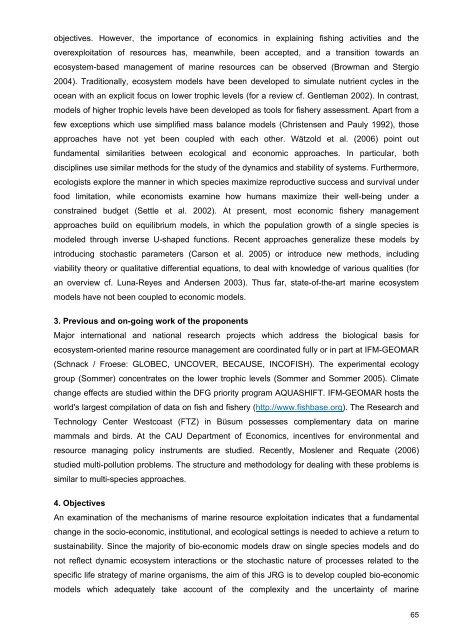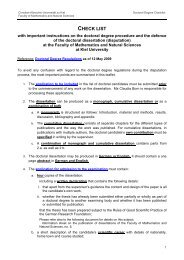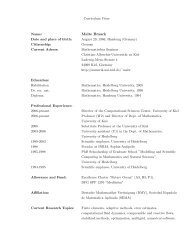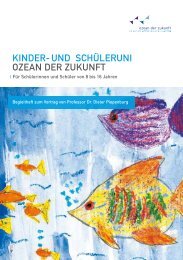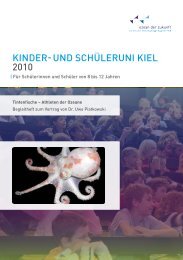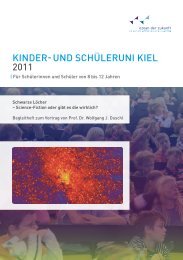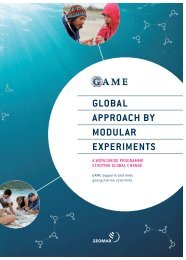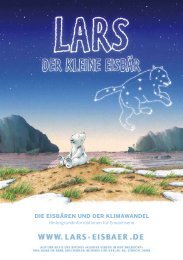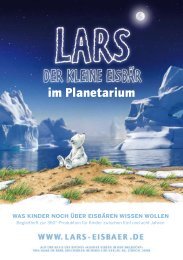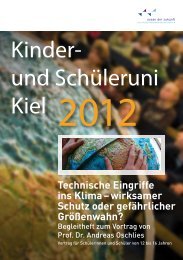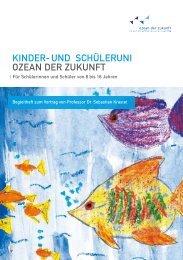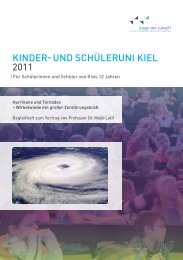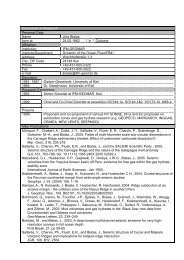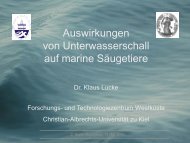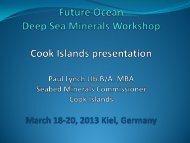objectives. However, the importance of economics in explaining fishing activities and theoverexploitation of resources has, meanwhile, been accepted, and a transition towards anecosystem-based management of marine resources can be observed (Browman and Stergio2004). Traditionally, ecosystem models have been developed to simulate nutrient cycles in theocean with an explicit focus on lower trophic levels (for a review cf. Gentleman 2002). In contrast,models of higher trophic levels have been developed as tools for fishery assessment. Apart from afew exceptions which use simplified mass balance models (Christensen and Pauly 1992), thoseapproaches have not yet been coupled with each other. Wätzold et al. (2006) point outfundamental similarities between ecological and economic approaches. In particular, bothdisciplines use similar methods for the study of the dynamics and stability of systems. Furthermore,ecologists explore the manner in which species maximize reproductive success and survival underfood limitation, while economists examine how humans maximize their well-being under aconstrained budget (Settle et al. 2002). At present, most economic fishery managementapproaches build on equilibrium models, in which the population growth of a single species ismodeled through inverse U-shaped functions. Recent approaches generalize these models byintroducing stochastic parameters (Carson et al. 2005) or introduce new methods, includingviability theory or qualitative differential equations, to deal with knowledge of various qualities (foran overview cf. Luna-Reyes and Andersen 2003). Thus far, state-of-the-art marine ecosystemmodels have not been coupled to economic models.3. Previous and on-going work of the proponentsMajor international and national research projects which address the biological basis forecosystem-oriented marine resource management are coordinated fully or in part at IFM-GEOMAR(Schnack / Froese: GLOBEC, UNCOVER, BECAUSE, INCOFISH). <strong>The</strong> experimental ecologygroup (Sommer) concentrates on the lower trophic levels (Sommer and Sommer 2005). Climatechange effects are studied within the DFG priority program AQUASHIFT. IFM-GEOMAR hosts theworld's largest compilation of data on fish and fishery (http://www.fishbase.org). <strong>The</strong> Research andTechnology Center Westcoast (FTZ) in Büsum possesses complementary data on marinemammals and birds. At the CAU Department of Economics, incentives for environmental andresource managing policy instruments are studied. Recently, Moslener and Requate (2006)studied multi-pollution problems. <strong>The</strong> structure and methodology for dealing with these problems issimilar to multi-species approaches.4. ObjectivesAn examination of the mechanisms of marine resource exploitation indicates that a fundamentalchange in the socio-economic, institutional, and ecological settings is needed to achieve a return tosustainability. Since the majority of bio-economic models draw on single species models and donot reflect dynamic ecosystem interactions or the stochastic nature of processes related to thespecific life strategy of marine organisms, the aim of this JRG is to develop coupled bio-economicmodels which adequately take account of the complexity and the uncertainty of marine65
ecosystems. In particular, the following objectives will be addressed: (1) Evaluation, improvementand coupling of multi-species and ecosystem models with respect to their applicability inecosystem-based fishery management; (2) coupling of improved dynamic and stochastic multispecies/ ecosystem models with economic models to substitute Gordon-Schäfer approaches; (3)development of ecologic and economic indicators to evaluate management performance; (4)creation of policy rules for decentralized decision making, e.g., indicator-based individually tradablefishing quotas (ITQ’s) including regimes for banking and non-linear landing fees, combined withtechnological and behavioral standards; (5) simulation of scenarios on the basis of the modelsoutlined above using advanced numerical methods with stochastic parameters and (6) employmentof an integrated approach to ecological dynamics and the human use of marine resources for thepurpose of evaluating policy scenarios.<strong>The</strong> intensive modeling approach, including stochastic components, requires strong support by P1.Links are given to topics defined under B2, B5 and A7. B6 investigates the degree to which newlydeveloped decentralizing incentive schemes are compatible with international law. Results fromA1, A3, and A4 will be important for forecasting ecological indicators, such as temperature, CO 2concentrations and salinity, which are crucial for the development of species populations.5. ReferencesBrowman HI, Stergiou KI (eds) (2004) Perspectives on ecosystem-based approaches to themanagement of marine resources. Mar. Ecol. Prog. Ser. 274, 269–303.Carson T, Granger C, Jackson J, Schlenker W (2005) Are Current Fisheries Management ModelsWrong? UCSD-Disc. Paper, Dept. of Economics & Scripps Institution of <strong>Ocean</strong>ography.Christensen V, Pauly D (1992) Ecopath II—a software for balancing steady-state ecosystemmodels and calculating network characteristics. Ecol. Model. 61, 169–185.Gentleman WC (2002) A chronology of plankton dynamics in silico: How computer models havebeen used to study marine ecosystems. Hydrobiologia 480, 69-85.Luna-Reyes LF, Andersen DL (2003) Collecting and analyzing qualitative data for systemdynamics: Methods and models. Syst. Dynam. Rev. 19(4), 271-296.Moslener U, Requate T (2006) Abatement in the Multi-Pollutant Case: When Stock-Pollutants areComplements or Substitutes. J. Econ. Dyn. Control (in press).Pauly D, Christensen V, Dalsgaard J, Froese R, Torres F Jr (1998) Fishing down marine foodwebs. Science 279, 860-863.Settle C, Crocker TD, Shogren JF (2002) On the joint determination of biological and economicsystems. Ecol. Econ. 42, 301-312.Sommer U, Sommer F (2005) Cladocerans versus copepods: the cause of contrasting top-downcontrols on freshwater and marine phytoplankton. Oecologia 135, 639-647.Wätzold F et al. (2006) Ecological-economic modeling for biodiversity management: Potential,pitfalls, prospects. Conserv. Biol. (in press).66
- Page 7 and 8:
Contents1 General Information about
- Page 9 and 10:
1 General Information about the Clu
- Page 11 and 12:
1.2 Research Program1.2.1 Summary/Z
- Page 13 and 14:
1.2.2.2 ObjectivesThe Future Ocean
- Page 15 and 16:
will address the emerging new resea
- Page 17 and 18:
Topics Objectives DisciplinesA1 Exa
- Page 19 and 20:
development of these new initiative
- Page 21 and 22: Project Objective IndustryPartnersO
- Page 23 and 24: Continued excellence in the field o
- Page 25 and 26: The establishment of several new po
- Page 27 and 28: 1.4.1 Integrated School of Ocean Sc
- Page 29 and 30: ensure that emerging innovations wi
- Page 31 and 32: Institute / DisciplineAcademic Leve
- Page 33 and 34: their orientation according to the
- Page 35 and 36: 1.7.2 Structural Evolution and Qual
- Page 37 and 38: 30- Notes -
- Page 39 and 40: organisms to elevated CO 2 and decr
- Page 41 and 42: ist wahrscheinlich stärker als wä
- Page 43 and 44: out by the proponents and will esta
- Page 45 and 46: Rückkopplungsschleife weitere Erw
- Page 47 and 48: enthic biota of gas release or the
- Page 49 and 50: Synthese, aufbauend auf einer Kombi
- Page 51 and 52: (4) a determination of the impact o
- Page 53 and 54: Einflüsse. Um deren Auswirkungen b
- Page 55 and 56: on longer time scales. The latter t
- Page 57 and 58: werden kann. Allerdings sind die ch
- Page 59 and 60: the expertise which already exists
- Page 61 and 62: 2. State-of-the-artThe changing com
- Page 63 and 64: • Field and laboratory investigat
- Page 65 and 66: Erwärmung der Ozeane kann zur Frei
- Page 67 and 68: Valuing the Ocean: Research focus a
- Page 69 and 70: submarine earthquakes, slumps and s
- Page 71: Fischerei ist eine der wichtigsten
- Page 75 and 76: Hochdurchsatztechnologien die Evolu
- Page 77 and 78: microbial diversity on their barrie
- Page 79 and 80: transient three-dimensional fluid f
- Page 81 and 82: modeling, which describe chemical a
- Page 83 and 84: Erdbeben, submarine Hangrutschungen
- Page 85 and 86: Simons 2003) to investigate shallow
- Page 87 and 88: damit zusammenhängender Meeresspie
- Page 89 and 90: B5(1) Sea-Level Rise and Physical-M
- Page 91 and 92: Pickrill RA, Todd BJ (2003) The mul
- Page 93 and 94: Onate E, Piazzese J (2005) Decision
- Page 95 and 96: echtlichen und ökonomischen Rahmen
- Page 97 and 98: marine resources, such as energy ex
- Page 99 and 100: 92- Notes -
- Page 101 and 102: 2. State-of-the-artThe variety of n
- Page 103 and 104: and will benefit from expertise in
- Page 105 and 106: Die Plattform 2 stellt die analytis
- Page 107 and 108: 4. New Cluster TechnologiesIn order
- Page 109 and 110: (iv) Proteomanalysetechniken und (v
- Page 111 and 112: 4. New Cluster TechnologiesA specia
- Page 113 and 114: Illustration of existing/emerging a
- Page 115 and 116: physical parameters (e.g. lowered a
- Page 117 and 118: etabliert, das insbesondere auf wis
- Page 119 and 120: 2.4.3.2 Central Funds for Transfer
- Page 121 and 122: International School of Ocean Scien
- Page 123 and 124:
Description Year of purchase Amount
- Page 125 and 126:
3.2 Auxiliary Support3.2.1 Total Fu
- Page 127 and 128:
120- Notes -
- Page 129 and 130:
Suess E, Torres ME, Bohrmann G, Col
- Page 131 and 132:
Schreiber, StefanVisbeck, MartinSri
- Page 133 and 134:
4.3 Third-Party FundingNo. FundingB
- Page 135 and 136:
Leibniz Institute of Marine Science
- Page 137 and 138:
These JRG’s will augment the expe
- Page 139 and 140:
The Cluster is embedded in the “K
- Page 141 and 142:
A14- Notes -
- Page 143 and 144:
4.6 Curricula Vitae and Lists of Pu
- Page 145 and 146:
Curriculum of ResearchPersonal Data
- Page 147 and 148:
Curriculum of ResearchPersonal Data
- Page 149 and 150:
Curriculum of ResearchPersonal Data
- Page 151 and 152:
Curriculum of ResearchPersonal Data
- Page 153 and 154:
Curriculum of ResearchPersonal Data
- Page 155 and 156:
Curriculum of ResearchPersonal Data
- Page 157 and 158:
Curriculum of ResearchPersonal Data
- Page 159 and 160:
Curriculum of ResearchPersonal Data
- Page 161 and 162:
Curriculum of ResearchPersonal Data
- Page 163 and 164:
Curriculum of ResearchPersonal Data
- Page 165 and 166:
Curriculum of ResearchPersonal Data
- Page 167 and 168:
Curriculum of ResearchPersonal Data
- Page 169 and 170:
Curriculum of ResearchPersonal Data
- Page 171 and 172:
Curriculum of ResearchPersonal Data
- Page 173 and 174:
Curriculum of ResearchPersonal Data
- Page 175 and 176:
Curriculum of ResearchPersonal Data
- Page 177 and 178:
Curriculum of ResearchPersonal Data
- Page 179 and 180:
Curriculum of ResearchPersonal Data
- Page 181 and 182:
Curriculum of ResearchPersonal Data
- Page 183 and 184:
Curriculum of ResearchPersonal Data
- Page 185 and 186:
Curriculum of ResearchPersonal Data
- Page 187 and 188:
Curriculum of ResearchPersonal Data
- Page 189 and 190:
Curriculum of ResearchPersonal Data
- Page 191 and 192:
Curriculum of ResearchPersonal Data
- Page 193 and 194:
Curriculum of ResearchPersonal Data
- Page 195 and 196:
Curriculum of ResearchPersonal Data
- Page 197 and 198:
Curriculum of ResearchPersonal Data
- Page 199 and 200:
Curriculum of ResearchPersonal Data
- Page 201 and 202:
Curriculum of ResearchPersonal Data
- Page 203 and 204:
Curriculum of ResearchPersonal Data
- Page 205 and 206:
Curriculum of ResearchPersonal Data
- Page 207 and 208:
Curriculum of ResearchPersonal Data
- Page 209 and 210:
A82- Notes -
- Page 211 and 212:
DEKLIMGerman Climate Research Progr
- Page 213 and 214:
ITQ’sISAISOSJRGKCMSKitzLALIFLIMSL
- Page 215 and 216:
WTOWTSHXAFSXRDZMBWorld Trade Organi
- Page 218:
Prof. Dr. Boris Culik • Maritimes
- Page 230:
GMT-Geschäf*sstelleWe"*w{eltJ"*n $
- Page 236:
f,rylheonRaytheon Anschütz GmbHPos


